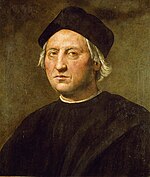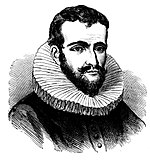List of explorers
Appearance

Explorers are listed below with their common names, countries of origin (modern and former), centuries of activity and main areas of exploration.



 Diogo Cão (c.1452–1486) was the first European to explore the Congo River and the west coast of Africa, south of the equator.
Diogo Cão (c.1452–1486) was the first European to explore the Congo River and the west coast of Africa, south of the equator.
 Bartolomeu Dias (c.1450–1500) is known as the first European to sail around the southernmost tip of Africa in 1488, finding the eastern sea route to the Indian Ocean.
Bartolomeu Dias (c.1450–1500) is known as the first European to sail around the southernmost tip of Africa in 1488, finding the eastern sea route to the Indian Ocean.
 Christopher Columbus (1451–1506). Famous Genoese explorer, known for "discovering" America in 1492, although he believed the landmass was a part of Asia.
Christopher Columbus (1451–1506). Famous Genoese explorer, known for "discovering" America in 1492, although he believed the landmass was a part of Asia.
 Alonso de Ojeda (c.1466–c.1515) is noted as the discoverer of South America, as commander of the fleet with Juan de la Cosa and Amerigo Vespucci.
Alonso de Ojeda (c.1466–c.1515) is noted as the discoverer of South America, as commander of the fleet with Juan de la Cosa and Amerigo Vespucci.
 John Cabot (c.1450–c.1500) was an Italian navigator who was the first European that sailed along to North American coast in 1497 since the Norse 500 years prior.
John Cabot (c.1450–c.1500) was an Italian navigator who was the first European that sailed along to North American coast in 1497 since the Norse 500 years prior.
 Vasco da Gama (c.1460–1524). Famous Portuguese explorer who sailed to India in 1497–98. He accomplished finding a sea route to Asia which Europeans had been attempting to do for decades prior.
Vasco da Gama (c.1460–1524). Famous Portuguese explorer who sailed to India in 1497–98. He accomplished finding a sea route to Asia which Europeans had been attempting to do for decades prior.

 Amerigo Vespucci (1451–1512). Italian navigator who made several trips to the New World. He is known for convincing the Europeans that the New World is not Asia, but an entirely new unknown continent. This new continent was soon named after him, America.
Amerigo Vespucci (1451–1512). Italian navigator who made several trips to the New World. He is known for convincing the Europeans that the New World is not Asia, but an entirely new unknown continent. This new continent was soon named after him, America.
 Pedro Álvares Cabral (c.1467–c.1520) discovered the land in what is now Brazil in 1500 and claimed it for Portugal.
Pedro Álvares Cabral (c.1467–c.1520) discovered the land in what is now Brazil in 1500 and claimed it for Portugal.
 Afonso de Albuquerque (c.1453–1515) raided, captured, and conquered many coastal cities in Asia that initiated Portugal's dominance in the Indian Ocean. He is also one of the first Europeans to sail to the East Indies and Spice Islands, along with Francisco Serrão and António de Abreu.
Afonso de Albuquerque (c.1453–1515) raided, captured, and conquered many coastal cities in Asia that initiated Portugal's dominance in the Indian Ocean. He is also one of the first Europeans to sail to the East Indies and Spice Islands, along with Francisco Serrão and António de Abreu.
 Juan Ponce de León (1474–1521) was the first Governor of Puerto Rico and discovered Florida in 1513. He is the first known European to set foot on today's contiguous United States.
Juan Ponce de León (1474–1521) was the first Governor of Puerto Rico and discovered Florida in 1513. He is the first known European to set foot on today's contiguous United States.
 Vasco Núñez de Balboa (c.1475–1519) is known for having crossed the Isthmus of Panama to the Pacific Ocean in 1513, becoming the first European to reach and see the Pacific from the America's
Vasco Núñez de Balboa (c.1475–1519) is known for having crossed the Isthmus of Panama to the Pacific Ocean in 1513, becoming the first European to reach and see the Pacific from the America's
 Hernán Cortés (1485–1547). Famous Conquistador who led the Spanish expedition to explore and conquer the Aztec Empire (1519–1521).
Hernán Cortés (1485–1547). Famous Conquistador who led the Spanish expedition to explore and conquer the Aztec Empire (1519–1521).
 Ferdinand Magellan (1480–1521) was a Portuguese explorer who led the successful expedition under Spain to find a western sea route to Asia (1519–1521).
Ferdinand Magellan (1480–1521) was a Portuguese explorer who led the successful expedition under Spain to find a western sea route to Asia (1519–1521).
 Juan Sebastián Elcano (c.1486–1526) took command after Ferdinand's death and completed the voyage, becoming the first person (along with 17 other crewmates) to circumnavigate the Earth.
Juan Sebastián Elcano (c.1486–1526) took command after Ferdinand's death and completed the voyage, becoming the first person (along with 17 other crewmates) to circumnavigate the Earth.
 Jacques Cartier (1491–1557) was the first European to travel inland in North America and claimed the lands he explored for France in 1534.
Jacques Cartier (1491–1557) was the first European to travel inland in North America and claimed the lands he explored for France in 1534.
 Francis Drake (c.1540–1596) was an English privateer who plundered many Spanish towns and ships in the Caribbean and elsewhere. However, he is most notable for completing the second circumnavigation of the world (1577–1580).
Francis Drake (c.1540–1596) was an English privateer who plundered many Spanish towns and ships in the Caribbean and elsewhere. However, he is most notable for completing the second circumnavigation of the world (1577–1580).
 Samuel de Champlain (1567–1635) is known as "The Father of New France". He founded the first permanent European settlements in Canada, and explored many lakes and rivers in the interior lands from early age to his death.
Samuel de Champlain (1567–1635) is known as "The Father of New France". He founded the first permanent European settlements in Canada, and explored many lakes and rivers in the interior lands from early age to his death.

 Henry Hudson (c.1565–c.1611) explored what is now New York and northeastern Canada. Today he has both a river and bay named after him.
Henry Hudson (c.1565–c.1611) explored what is now New York and northeastern Canada. Today he has both a river and bay named after him.
 Abel Tasman (1603–1659) was a Dutch seafarer who was the first known European to sight the islands of Tasmania (named after him), New Zealand, and Fiji (1642–43).
Abel Tasman (1603–1659) was a Dutch seafarer who was the first known European to sight the islands of Tasmania (named after him), New Zealand, and Fiji (1642–43).
 James Cook (1728–1779). Famous British explorer who led three voyages to the Pacific. He is known for exploring and charting many islands in the ocean such as Polynesia, New Zealand, The Hawaiian Islands, and the eastern coast of Australia.
James Cook (1728–1779). Famous British explorer who led three voyages to the Pacific. He is known for exploring and charting many islands in the ocean such as Polynesia, New Zealand, The Hawaiian Islands, and the eastern coast of Australia.
 David Livingstone (1813–1873) is a Scottish explorer and missionary who sought to convert the locals to Christianity and expand British colonization, all the while discovering lakes and rivers within Africa's interior.
David Livingstone (1813–1873) is a Scottish explorer and missionary who sought to convert the locals to Christianity and expand British colonization, all the while discovering lakes and rivers within Africa's interior.
 Roald Amundsen (1872–1928) was an explorer of the polar regions. He led the first successful expedition to the South Pole in 1911, and eventually also reached the North Pole by air in 1926.
Roald Amundsen (1872–1928) was an explorer of the polar regions. He led the first successful expedition to the South Pole in 1911, and eventually also reached the North Pole by air in 1926.List
[edit]See also
[edit]- Age of Discovery
- Astronaut/Cosmonaut/Taikonaut
- Bandeirantes
- Chronology of European exploration of Asia
- Conquistador
- Exploration
- List of explorations
- List of lost expeditions
- List of female explorers and travelers
- List of maritime explorers
- List of Russian explorers
- List of travelers
- Maritime timeline
- Portuguese discoveries
- Radhanites
- Silk Road
- Spice trade
- The Exploration Museum
- Timeline of maritime migration and exploration
- Trans-Saharan trade
- Travel literature
References
[edit]- ^ "Travellers on the Silk Road before the year 1000 AD - Silk-Road.com". Archived from the original on 11 April 2001. Retrieved 14 June 2022.
- ^ Battuta's Travels: Part Three – Persia and Iraq Archived 23 April 2008 at the Wayback Machine
- ^ "Memoirs and Travels of Mauritius Augustus Count de Benyowsky: Consisting of His Military Operations in Poland, His Exile into Kamchatka, His Escape and Voyage from that Peninsula through the Northern Pacific Ocean, Touching at Japan and Formosa, to Canton in China, with an Account of the French Settlement He Was Appointed to Form upon the Island of Madagascar". World Digital Library. 1790. Archived from the original on 22 April 2009. Retrieved 6 July 2013.
- ^ Giovanni Caboto.
- ^ Cristoforo Colombo.
- ^ "The World of Ahmed Bey Hassanein". saharasafaris.org. Archived from the original on 3 May 2021. Retrieved 14 June 2022.
- ^ Kamchatka, Caucasus, Siberia.
- ^ "Sahara and Sudan: The Results of Six Years Travel in Africa". World Digital Library. 1879–1889. Archived from the original on 3 May 2021. Retrieved 2 October 2013.
- ^ New South Wales, southeastern Queensland.
- ^ Sir Paul de Strzelecki.
- ^ Cossack.
- ^ U.S. Pacific Coast, Pacific Northwest.
- ^ Allegheny Mountains, Cumberland Plateau.
